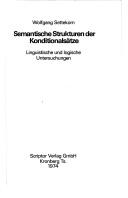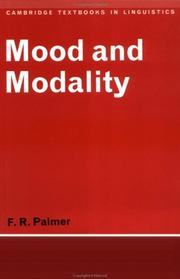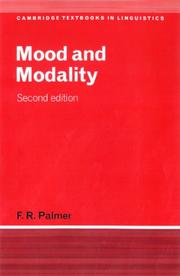| Listing 1 - 10 of 16 | << page >> |
Sort by
|
Book
ISBN: 9780199591435 0199591431 Year: 2016 Publisher: Oxford: Oxford university press,
Abstract | Keywords | Export | Availability | Bookmark
 Loading...
Loading...Choose an application
- Reference Manager
- EndNote
- RefWorks (Direct export to RefWorks)
Lexicology. Semantics --- Grammar --- Modalité (linguistique) --- Grammaire comparée --- Modality (Linguistics) --- Grammar, Comparative and general --- Mood --- Mode (Grammar) --- Mood (Grammar) --- Linguistics --- Verb --- Grammaire comparée. --- Philology --- Grammar, Comparative and general - Mood --- Modalité (linguistique) --- Grammaire comparée.

ISBN: 3589000759 Year: 1974 Publisher: Kronberg/Ts. : Scriptor Verlag,
Abstract | Keywords | Export | Availability | Bookmark
 Loading...
Loading...Choose an application
- Reference Manager
- EndNote
- RefWorks (Direct export to RefWorks)
Lexicology. Semantics --- Grammar, Comparative and general --- Phrase (Linguistique) --- Modes (Linguistique) --- Sentences --- Mood --- 801.56 --- Syntaxis. Semantiek --- Mood. --- Sentences. --- 801.56 Syntaxis. Semantiek --- Language and languages --- Sentences (Grammar) --- Mode (Grammar) --- Mood (Grammar) --- Verb --- Linguistics --- Philology

ISBN: 0521319307 0521265169 9780521319300 9780521265164 Year: 1986 Publisher: Cambridge : Cambridge university press,
Abstract | Keywords | Export | Availability | Bookmark
 Loading...
Loading...Choose an application
- Reference Manager
- EndNote
- RefWorks (Direct export to RefWorks)
Modality (Linguistics) --- Grammar, Comparative and general --- Mood --- 801.56 --- Syntaxis. Semantiek --- 801.56 Syntaxis. Semantiek --- Modes (Linguistique) --- Modalité (Linguistique) --- Linguistics --- Mode (Grammar) --- Mood (Grammar) --- Verb --- Grammar --- Modality (Linguistics). --- Mood. --- Philology --- Grammar, Comparative and general - Mood
Book
ISBN: 9780199547531 9780199547524 Year: 2018 Publisher: Oxford Oxford University Press
Abstract | Keywords | Export | Availability | Bookmark
 Loading...
Loading...Choose an application
- Reference Manager
- EndNote
- RefWorks (Direct export to RefWorks)
This book presents the essential background for understanding semantic theories of mood. 'Mood' as a category is widely used in the description of languages and the formal analysis of their grammatical properties. It typically refers to the features of a sentence-individual morphemes or grammatical patterns-that reflect how the sentence contributes to the modal meaning of a larger phrase, or that indicate the type of fundamental pragmatic function that it has in conversation. In this volume, Paul Portner discusses the most significant semantic theories relating to the two main subtypes of mood: verbal mood, including the categories of indicative and subjunctive subordinate clauses, and sentence mood, encompassing declaratives, interrogatives, and imperatives. He evaluates those theories, compares them, and draws connections between seemingly disparate approaches, and he formalizes some of the literature's most important ideas in new ways in order to draw out their most significant insights.0Ultimately, this work shows that there are crucial connections between verbal mood and sentence mood which point the way towards a more general understanding of how mood works and its relation to other topics in linguistics; it also outlines the type of semantic and pragmatic theory which will make it possible to explain these relations. The book will be a valuable resource for researchers and students from advanced undergraduate level upwards in the fields of semantics and pragmatics, philosophy, computer science, and psychology.
Grammar, Comparative and general --- Semantics --- Formal semantics --- Semasiology --- Semiology (Semantics) --- Mood --- Mode (Grammar) --- Mood (Grammar) --- Comparative linguistics --- Information theory --- Language and languages --- Lexicology --- Meaning (Psychology) --- Verb --- Sémantique --- Modes (linguistique) --- Grammaire comparée --- Sémantique. --- Grammaire comparée. --- Linguistics --- Philology --- Lexicology. Semantics --- Grammar --- Pragmatics
Book
ISBN: 9027270791 9789027270795 1306347262 9781306347266 9789027206169 9027206163 Year: 2014 Publisher: Amsterdam : John Benjamins Publishing Company,
Abstract | Keywords | Export | Availability | Bookmark
 Loading...
Loading...Choose an application
- Reference Manager
- EndNote
- RefWorks (Direct export to RefWorks)
Modality is one of the grammatical categories in Igbo language studies that received the least attention within the last century. There is, however, a growing awareness that the category of modality is expressed in the language through specific verbs and suffixes that have recently been (re-)categorised as modal verbs and modal suffixes, respectively (Uchechukwu 2008, 2011). This paper explores further the issue of modality in Igbo by focusing on the constructions and lexical items that could be involved in the implicit expression of modality in the language. The different types of construction
Modality (Linguistics) --- Grammar, Comparative and general --- Cognitive grammar. --- Typology (Linguistics) --- Linguistic universals. --- Language and languages --- Universals (Linguistics) --- Linguistics --- Linguistic typology --- Linguistic universals --- Cognitive linguistics --- Psycholinguistics --- Tense (Grammar) --- Mode (Grammar) --- Mood (Grammar) --- Mood. --- Tense. --- Universals --- Typology --- Classification --- Temporal constructions --- Verb --- Philology
Multi
ISBN: 9781108989732 9781108839280 9781108970570 1108991378 1108997244 110898973X 1108839282 Year: 2022 Publisher: Cambridge Cambridge University Press
Abstract | Keywords | Export | Availability | Bookmark
 Loading...
Loading...Choose an application
- Reference Manager
- EndNote
- RefWorks (Direct export to RefWorks)
Bringing together fifty years' worth of cross-linguistic research, this pioneering monograph explores the complex interaction between tense, mood and aspect. It looks at the long way of combining elementary semantic units at the bottom of phrase structure up to and including the top of a sentence. Rejecting ternary tense as blocking compositionality, it introduces three levels obtained by binary tense oppositions. It also counters an outdated view on motion by assuming that change is not expressed as having an inherent goal but rather as dynamic interaction between different number systems that allows us to package information into countable and continuous units. It formally identifies the central role of a verb in a variety of argument structures and integrates adverbial modifiers into the compositional structure at different tense levels of phrase structure. This unique contribution to the field will be essential reading for advanced students and researchers in the syntax-semantics interface.
Grammar --- Grammar, Comparative and general --- Tense (Grammar) --- Aspect (Linguistics) --- Mode (Grammar) --- Mood (Grammar) --- Tense --- Mood --- Aspect --- Temporal constructions --- Verbal aspect --- Verb --- Tense. --- Mood. --- Aspect. --- Linguistics --- Philology --- Gramàtica comparada --- Semàntica

ISBN: 0521800358 0521804795 1139167170 9781139167178 9780521804790 9780521800358 Year: 2001 Volume: *33 Publisher: Cambridge: Cambridge university press,
Abstract | Keywords | Export | Availability | Bookmark
 Loading...
Loading...Choose an application
- Reference Manager
- EndNote
- RefWorks (Direct export to RefWorks)
Since the publication of F. R. Palmer's first edition of Mood and Modality in 1986, when the topic of 'modality' was fairly unfamiliar, there has been considerable interest in the subject as well as in grammatical typology in general. Modality is concerned with mood (subjunctive etc.) and with modal markers such as English modal verbs (can, may, must etc.) and is treated as a single grammatical category found in most of the languages of the world. In his investigation of this category, Palmer draws on a wealth of examples from a wide variety of languages. He discusses in detail familiar features in a number of mainly European languages, and also looks at less familiar features including 'evidential' systems and the contrast of realis/irrealis, both to be found in unrelated languages.
Modaliteit (Taalwetenschap) --- Modality (Linguistics) --- Modalité (Linguistique) --- 801.56 --- Linguistics --- Syntaxis. Semantiek --- Grammar, Comparative and general --- Mood. --- 801.56 Syntaxis. Semantiek --- Modality (Linguistics). --- Mode (Grammar) --- Mood (Grammar) --- Mood --- Verb --- Grammar --- Grammar, Comparative and general - Mood. --- Arts and Humanities --- Language & Linguistics --- Philology --- Grammar, Comparative and general - Mood
Book
ISBN: 9789027205872 9027205876 9789027287632 9027287635 128297694X 9781282976948 9786612976940 6612976942 Year: 2010 Volume: 120 Publisher: Amsterdam ; Philadelphia : John Benjamins Pub. Company,
Abstract | Keywords | Export | Availability | Bookmark
 Loading...
Loading...Choose an application
- Reference Manager
- EndNote
- RefWorks (Direct export to RefWorks)
This book is the first comprehensive survey of mood in the languages of Europe. It gives readers access to a collection of data on mood. Each article presents the mood system of a specific European language in a way that readers not familiar with this language are able to understand and to interpret the data. The articles contain information on the morphology and semantics of the mood system, the possible combinations of tense and mood morphology, and the possible uses of the non-indicative mood(s). The papers address the explanation of mood from an empirical and descriptive perspective. This book is of interest to scholars of mood and modality, language contact, and areal linguistics and typology.
Modality (Linguistics) --- Grammar, Comparative and general --- Mood. --- Grammar --- Linguistics --- Mode (Grammar) --- Mood (Grammar) --- Mood --- Verb --- Philology --- Grammaire comparée --- Modalité (linguistique) --- Grammaire comparative et générale --- Langues indo-européennes --- Grammaire comparée --- Modalité (linguistique) --- Grammaire comparative et générale --- Langues indo-européennes
Book
ISBN: 9783110521856 3110521857 3110524082 9783110524086 3110521997 9783110521993 Year: 2017 Publisher: Berlin, [Germany] ; Boston, [Massachusetts] : De Gruyter Mouton,
Abstract | Keywords | Export | Availability | Bookmark
 Loading...
Loading...Choose an application
- Reference Manager
- EndNote
- RefWorks (Direct export to RefWorks)
Research into the “grammar of language death” is often biased toward formal processes (e.g. paradigmatic levelling). In this study the author changes the perspective and shows that the relative susceptibility of linguistic elements to loss, change and innovation in language death circumstances can be dependent on meaning and thus organized along semantic notions rather than along structure.
Modality (Linguistics) --- Grammar, Comparative and general --- Language obsolescence. --- Semantics --- Finnic languages --- Mood. --- History. --- Modality. --- Language obsolescence --- Formal semantics --- Semasiology --- Semiology (Semantics) --- Language and languages --- Language death --- Obsolescence of languages --- Mode (Grammar) --- Mood (Grammar) --- Mood --- History --- Obsolescence --- E-books --- Comparative linguistics --- Information theory --- Lexicology --- Meaning (Psychology) --- Historical linguistics --- Sociolinguistics --- Endangered languages --- Extinct languages --- Linguistics --- Verb --- Philology --- Finnic Languages. --- Language Death.
Book
ISBN: 9789042035591 9789401208345 9401208344 9401208344 9042035595 1283868717 Year: 2012 Publisher: Amsterdam : Rodopi,
Abstract | Keywords | Export | Availability | Bookmark
 Loading...
Loading...Choose an application
- Reference Manager
- EndNote
- RefWorks (Direct export to RefWorks)
The present volume is a collection of fourteen original papers selected from those presented at the first US installment of Chronos: International Conference on Tense, Aspect, Mood and Modality, which took place at the University of Texas at Austin in October, 2008. The volume serves as an excellent forum for international scholars working on expressions of on tense, aspect, mood and modality. It contains papers dealing with a diverse variety of languages ranging from well studied languages like English, French, Italian, Spanish, Russian and Japanese, to less known ones like Basque, Chamorro, Iquito, Australian English and Singlish. The originality and relevance of the individual contributions is highlighted by the broadness of the theoretical approaches they employ and the novel empirical data they examine. All the studies go beyond exploring issues strictly related to tense, aspect, mood and modality; rather, they cut across all main linguistics subfields, such as syntax, semantics, pragmatics, language acquisition and language evolution, thus attesting to how research on tense, aspect, mood and modality is vital to the better understanding of human language in general. This diverse nature of the volume will certainly appeal to broad audience.
Grammar --- Grammar, Comparative and general --- Modality (Linguistics). --- Grammar, Comparative and general. --- Aspekt --- Modalität --- Modus. --- Tempus. --- Aspekt. --- Modalität. --- igeidő. --- modalitás --- nyelvtan --- Aspect. --- Tense. --- Mood. --- Nyelvészet. --- Tanulmányok. --- Tense (Grammar) --- Mode (Grammar) --- Mood (Grammar) --- Aspect (Linguistics) --- Comparative grammar --- Grammar, Philosophical --- Grammar, Universal --- Language and languages --- Philosophical grammar --- Linguistics --- Philology --- Tense --- Aspect --- Mood --- Temporal constructions --- Verb --- Verbal aspect --- Grammar, Comparative --- Modality (Linguistics)
| Listing 1 - 10 of 16 | << page >> |
Sort by
|

 Search
Search Feedback
Feedback About UniCat
About UniCat  Help
Help News
News